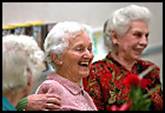|
|
‘Wise Women’ Share 270 Years of Wisdom on Healthy Aging
By Libby Keeling, Courier & Press
March 22, 2006

Vincent Pugliese, Courier & Press; Ruth Hertzel, left, Isabelle Lavens, center, and Adele Cottrell share a laugh at the Deaconess Women’s Hospital.
When nearly 270 combined years of experience take center stage, an audience is likely to sit up and take note. That's exactly what happened Tuesday evening when Adele Cottrell, 90, Ruth Hetzel, 90, and Isabel Lavens, 89, discussed healthy aging during Deaconess Women's Hospital's Wise Women Program.
"We're doing this by age," quipped Lavens, as the women shared portions of their life stories.
"She always rubs it in that she's younger than we are," retorted Hetzel.
The longtime friends, all widows, are imports to Evansville but have resided here for many years. Cottrell is the founder of Adele's Natural Foods, which has two locations in Evansville. Hetzel founded the nonprofit Self Awareness Center that operated here for about 20 years, and together Hetzel and Lavens introduced yoga to the area in the 1960s.
"It's as big a surprise to me as it is to my family that I've lived this long," Cottrell noted.
Although vibrant and witty, the women became serious as focus shifted to the topics of diet and exercise. Each subscribes to a vegetarian diet with differing exceptions for chicken, turkey and fish.
Meat is harder to digest, taking energy away from your body, Lavens said, and the best diet is raw vegetables, although obviously a person can't eat raw vegetables alone. Avoiding sugar and foods that make your body acidic also is important.
"You know, really, you only have one body and that's all you're going to get," Lavens said.
Not eating meat is about more than just not eating meat, according to Cottrell. It's also about not eating what has been done to the meat, such as the hormones that may be added to cattle and chicken feed.
"We're being sold a bill of goods," she said. "The closer we can stick to nature the better off we are." Milk takes hours to digest, Cottrell added, and no other animal drinks milk except when very young. Bypassing "white foods" - made with white flour - also is important, she said.
"You're responsible for your health," Cottrell said. "Ask questions and be aware of your body."
People interested in health should pay attention, Hetzel noted, adding that what you do once in a while won't hurt you.
According to Lavens, exercise is one of the keys to aging well. Although she likes yoga, Lavens said many studies indicate a swift 30-minute walk every day may be a viable option.
"Do a variety of things and let your body tell you what you need," Hetzel said. "Look at all the things that are being taught now."
She has a particular interest in feldenkrais - awareness through movement - and strength training. Still, Hetzel acknowledged the three friends can no longer do some of the activities that used to be really good for them.
"We don't want to make this aging sound too easy," she added. Age has brought challenges, including the loss of loved ones, problems with their own health and issues with the health of their family members.
"We realize what we struggle with is the thing we learn the most from," Hetzel said. "There's so much to human potential."
|
|



